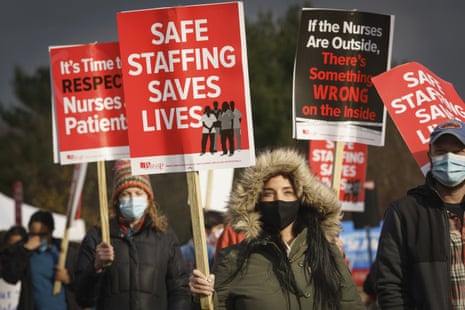Jim Gentile is haunted by the patients who died alone. A surgical nurse at St Mary medical center in Langhorne, Pennsylvania, his hospital was quickly overwhelmed during the first wave of the pandemic this spring, he said. He described racing between patients, only to discover that one had quietly suffocated while awaiting help.
He said he wrapped more patients in body bags in the first two months of the pandemic than he had in the previous 25 years. On Tuesday, he and 700 other nurses at the medical center went on strike after saying they were poorly compensated and short-staffed despite all they had to deal with as the virus surges again.
“Many of us have PTSD, and many of us would just sob on the way home,” he said. “And then 10 hours later we’d get back on the horse and do it all over again.”
Gentile and his colleagues are the latest in a wave of healthcare workers – from Washington DC, to New York, to California – to protest low pay, understaffing and PPE shortages during the pandemic.
Adding to their challenges is the politicization of Covid-19. Dozens of states have been slow to implement mask mandates and other public health measures that could slow the spread of the virus, and healthcare workers have reported cases of patients believing the illness to be a hoax even as they were being intubated. In North Dakota, nurses infected with the virus who did not show symptoms were asked to continue working amid staffing shortages.
“Nurses are totally burned out from this,” said Deborah Burger, a registered nurse and co-president of National Nurses United. “We’ve normalized this crisis. We’re staffing [hospitals] as if there were normal times and it’s not. Nurses who used to have, say, one [patient] code per shift are now seeing that exploding to where there are multiple codes going on. And it takes a toll.”
The risks they face are considerable. Lost on the Frontline, a joint investigation by the Guardian and Kaiser Health News, has identified nearly 1,400 frontline healthcare workers who appear to have died of Covid-19. Nearly one-third of those workers were nurses. Many more healthcare workers are struggling with illness, trauma and exhaustion.
Gentile said he’s heard criticism of nurses who picket when their patients need them most. “Everybody thinks, ‘Nurses are selfish. Why are they doing this now with a pandemic?’” he said. He said he and his colleagues pleaded with administrators to renegotiate during the summer, when the east coast was enjoying a brief respite from high case counts, and to hire more staff. The nurses say they are paid less than the regional average.
Hospital nurses said St Mary has a 30% turnover rate, with 243 of their colleagues leaving in the last two years alone, though representatives from the administration say the turnover rate is lower.
Gentile and his colleagues blame staffing shortages and an administration that “undervalues” its nurses.
The fact that Gentile and his colleagues are part of a union offers them some protection from retaliation. But other workers who have protested unsafe conditions have faced serious consequences. In March, four Detroit nurses who raised concerns about understaffing and equipment shortages lost their jobs for reportedly violating their hospital’s social media policy. A Chicago nurse was taken off her hospital’s schedule after sending an email to colleagues urging them to use more PPE than the hospital provided.
Administrators, who brought in a fleet of travel nurses to replace the striking workers until Sunday morning, when Gentile and others expect to return, had not responded to the union’s demands as of Friday afternoon. The hospital issued a statement saying it “remains committed to bargaining in good faith” and that its administrators take care to maintain “appropriate levels of staffing”.
Though it’s unclear whether the strike will yield any immediate policy changes, Gentile said he’s encouraged by the solidarity his colleagues have shown, by new virus treatments, and by the prospect of a vaccine being just around the corner.
But his optimism is tempered by the steady rise in cases at his hospital. “We still have four or five months of this to go,” he said.
